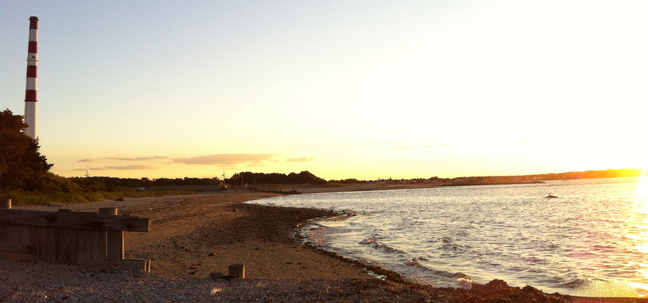
Leaving our hometowns and traveling abroad does indeed open our eyes to foreign places -- but perhaps more importantly, it opens our eyes to the places we leave.
I grew up in the small harbor town of Northport, N.Y., which is flanked by Atlantic beaches and anchored by a picturesque marina. Originally home to the Mattinecock tribes, the town was transformed into a cow-raising, ship-building and whale-hunting community after its purchase by Englishmen in 1656. Northport also contains the Crab Meadow beach, which is owned by the town and protected by the New York State Department of Environmental Conservation (DEC).
My brother and I grew up near a Crab Meadow beach teeming with activity -- fiddler crabs descended upon the beach at night to aggressively fornicate (not unlike the town's high school population), hermit crabs scuttled amongst the rocks during low tides, and lobster boats hauled in fresh catch on a daily basis. My brother burned his calf working on a lobster trawler and our Boy Scouts troop used to track the crab population.
After a long trip abroad, however, I've returned to a Crab Meadow beach that has gradually but strikingly devolved into a more polluted, less diverse, and uglier version of itself. The hermit and fiddler crabs have nearly disappeared over the past decade, and the Federal Drug Administration and DEC have long since banned consuming lobster and shellfish from the area. While overfishing has always been a problem in Long Island Sound, groups of non-professional fishermen now leave their plastic bottles and Styrofoam packaging without hesitation along Crab Meadow's shore. Packs of drinking high-schoolers trail trash behind their nocturnal gatherings and the town itself has been fined by the Environmental Protection Agency due to an amount of nitrogen in its harbor previously unheard of on Long Island.
Small steps, personal choices
Candidate Romney and President Obama have traded jibes about whose energy policy would lead to more independence from foreign oil, but neither have taken a moment to reflect on places like Crab Meadow and discuss how everyday citizens can attain this goal while cutting needless consumption and dampening the environmental damage our daily activities bear. The United States remains the world's biggest consumer of energy by far, but, in my opinion, not by necessity.
Our daily actions and choices have real consequences for the environment that we bequeath to our children, and I was taken aback by some of these American practices upon my return from abroad. As if a foreigner coming to the U.S. for the first time, I was immediately shocked by the out-of-control use of air conditioning. After two years of sweating and holding my nose in the French metro, I hardly expected to escape from the beating summer sun only to enter a sub-arctic shopping mall or movie theater. But many Americans have learned to take these temperature swings for granted, and I've consistently seen New Yorkers eagerly bound off overheated subway platforms only to shiver into an over-chilled subway car.
Tragedy of the Commons
The reckoning between the right and the left's visions of government is nigh, though perhaps not as clear-cut as some political attack ads would have you believe. Government spending has actually retracted under the Obama administration, while the putative Romney-Ryan embrace of Austrian philosopher Friedrich Hayek could send the pair into unnavigable and self-contradictory waters.
On climate change issues, however, both sides of the aisle have failed. The Solyndra affair has forced the Obama administration to view alternative energy as a liability, while Mitt Romney has repeatedly flip-flopped on the issue in the past two years alone.
Despite this typical governmental impasse, however, it is clear that the future of the environment cannot be left solely to market forces, despite and perhaps in light of the market-driven fracking boom. Buoyed by a series of wars in the Middle East, Americans have been delivered a seemingly unlimited access to artificially cheap oil, whereas gas in European service stations is now averaging a record $9 per gallon.
As loathe as we may be to admit it, we cannot solve collective action problems with individual efforts alone. The government is, at least in theory, designed to protect the interests that are not inherently profitable in the free market, such as law enforcement, aiding the poor, and protecting the environment. Hayek himself, in The Road to Serfdom, warned of "negative externalities" such as "the harmful effect of deforestation." Whoever wins in November, towns like Northport are steering an untenable course into the thicket of such externalities. So that the next generation of children and Boy Scouts can enjoy places like Crab Meadow, let's hope it can be reversed.
